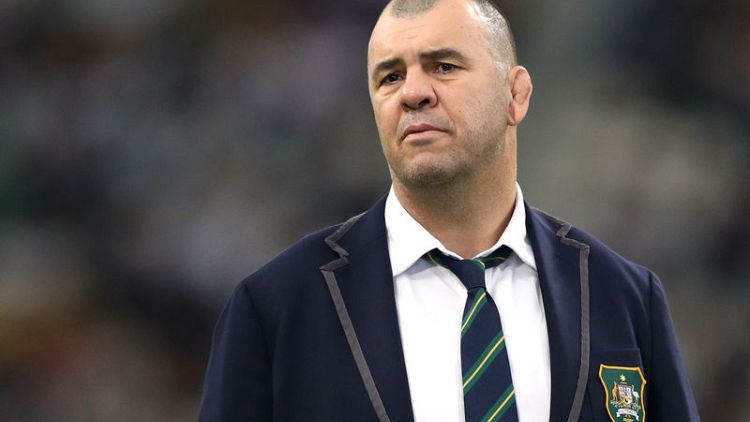By Ian Ransom
MELBOURNE (Reuters) - The Wallabies' quarter-final exit from the World Cup marked the end of coach Michael Cheika's tenure and may also spell the end of one of his more influential policies as Rugby Australia take a fresh look at rules governing national eligibility.
Cheika was instrumental in ushering in the 'Giteau Law', a 2015 regulation that allowed players based overseas to be selected for national duty as long as they had played 60 tests.
With selection previously restricted to players with domestic contracts, its implementation allowed Cheika to bring centre Matt Giteau and winger Drew Mitchell back into the fold for the World Cup in England, where Australia got to the final.
After announcing New Zealander Dave Rennie as Cheika's replacement on Wednesday, RA said it would turn its attention to the Giteau Law after completing its review into this year's World Cup in Japan.
South Africa also had a similar policy to the Giteau Law, limiting selection of overseas players to those with 30 test caps or more, but scrapped it in February.
In its place they brought in a rule that allows any player to be selected but offered those based in South Africa top-up payments according to a ranking system in a bid to keep the nation's top talent at home.
Less than nine months later, the Rassie Erasmus-coached Springboks raised their third Webb Ellis Cup after beating England in the final.
"Is it right for us? That's something we'll have to look at," RA's Director of Rugby Scott Johnson told reporters this week when asked about the South Africa policy.
"The reality is for the first part we need to sign the younger players and get them to play the game we want them to play, get them appropriately conditioned to play the game we want to play."
FLUID APPROACH
Like South Africa and New Zealand, Australia has struggled to compete with the salaries offered by northern hemisphere clubs and has seen a number of top players head overseas after Japan, effectively ruling them out of national selection.
Among them 33-cap centre Samu Kerevi, an explosive 26-year-old seen as a player Rennie could build a team around.
With Australia's Super Rugby sides battling to keep up with their New Zealand counterparts in recent years, the idea that a more flexible eligibility policy could trigger an exodus of talent overseas is an unedifying one for Rugby Australia.
Yet the thought of the Wallabies having another early trip home from the 2023 World Cup in France may move the governing body's hand.
"It’s a difficult question when relaxing the law might mean losing better players abroad earlier from Super Rugby in Australia," winger Mitchell told News Ltd media.
“I’m a bit torn because I always want the best possible team picked for the Wallabies and that’s the way you get the results that people are thirsting for.
"I’m saying Australian rugby needs to have a pretty fluid approach to that 60-test mark and adapt to the needs of the time."
Former Wallabies coach Alan Jones said Australia should be able to cast its selection net as widely as possible.
"We have to change the Giteau rules. We have to admit we are ranked sixth in the world," Jones wrote in a column for The Australian.
"If a player is good enough to play for Australia it should not matter where he plays."
(Editing by Peter Rutherford)
